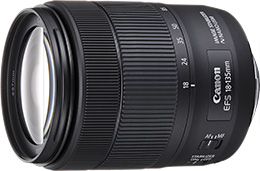The EOS 80D is one camera that you will find perfect for natural landscapes. Let’s examine several photos taken with it to get a better idea of its capabilities. (Reported by: Shirou Hagihara)

EOS 80D: A camera perfect for nature photography
For a professional photographer like myself, Canon's series of mid-range DSLRs is one of the few series that I find myself constantly coming back to. They may be categorised as mid-range models equipped with APS-C sized image sensors, but I value them highly for their ease-of-use and picture quality when shooting natural scenery.
*45-point all cross-type AF system that greatly expands the degree of freedom in the composition
The one improvement that I am most grateful for is that to the AF system. Thanks to the dramatic increase to 45 AF points, there is a leap in the degree of freedom of composition, which is most appealing to someone like me who takes a lot of hand-held shots.
Sometimes, when shooting hand-held, I may be tempted to try a bold, unconventional way of composing an image. The increase in the number of AF points means that there are fewer restrictions to where I can position the main subject to keep it in focus, therefore also tremendously increasing the number of hand-held scenes possible.
As all 45 AF points are cross-type points, there is higher focusing precision. In addition, the camera achieves rapid focusing even when you are using the AF points at the periphery of the screen. Indeed, the performance of the AF sensor alone is more than enough to make you feel the EOS 80D’s value for money.

EOS 80D/ EF-S10-18mm f/4.5-5.6 IS STM/ FL: 10mm (16mm equivalent)/ Aperture-priority AE (f/5.6, 1/30 sec., EV+1.7)/ ISO 2000/ WB: Daylight

EOS 80D/ EF-S18-135mm f/3.5-5.6 IS USM/ FL: 135mm (216mm equivalent)/ Aperture-priority AE (f/5.6, 1/400 sec., EV-0.3)/ ISO 800/ WB: 5,200K
Touch operations make Live View shooting a breeze
The touch shutter is extremely useful when shooting in Live View. It allows you to completely move the focal points far more quickly compared to using the Multi-Controller, and focus is established almost at exactly the same time, allowing you to shoot at a good pace. This makes photography with the EOS 80D a breeze.
Moreover, the extended battery life makes the camera even more reliable. Compared to previous models, it is now possible to take 1.5 times the number of shots even at normal or low temperatures when shooting in Live View. This can make all the difference to an outdoor photographer.
Depiction capability in the normal ISO range makes it great as a main camera
I also had no issues whatsoever with the image quality. Nothing surpasses the clear resolution and smooth textures of shots taken in the normal ISO range. With an upper ISO speed limit of ISO 16000, the camera also offers you the advantage of capturing a wide variety of scenes.
With its APS-C sized image sensor with a large depth of field, the EOS 80D boasts of image outputs and performance that position it as an ideal camera for nature photography.

EOS 80D/ EF-S18-135mm f/3.5-5.6 IS USM/ FL: 50mm (80mm equivalent)/ Aperture-priority AE (f/5, 1/125 sec., EV+1.3)/ ISO 200/ WB: 5,200K

EOS 80D/ EF-S18-135mm f/3.5-5.6 IS USM/ FL: 115mm (184mm equivalent)/ Aperture-priority AE (f/11, 1/80 sec., EV+0.3)/ ISO 200/ WB: Daylight

EOS 80D/ EF70-200mm f/4L IS USM/ FL: 127mm (203mm equivalent)/ Aperture-priority AE (f/4, 1/2,500 sec., EV±0)/ ISO 200/ WB: 5,200K

EOS 80D/ EF-S18-135mm f/3.5-5.6 IS USM/ FL: 116mm (186mm equivalent)/ Aperture- priority AE (f/11, 1/5,000 sec., EV-1.3)/ ISO 200/ WB: 5,200K
Receive the latest update on photography news, tips and tricks.
Be part of the SNAPSHOT Community.
Sign Up Now!About the Author
Born in 1959 in Yamanashi. After graduating from Nihon University, Hagihara was involved in the launch of the photography magazine Fukei Shashin where he worked as an editor and a publisher. He later resigned and became a freelance photographer. Currently, Hagihara is engaged in photography and written works centring on natural landscapes. He is a member of the Society of Scientific Photography (SSP).
A monthly magazine that believes that enjoyment of photography will increase the more one learns about camera functions. It delivers news on the latest cameras and features and regularly introduces various photography techniques.
Published by Impress Corporation







































